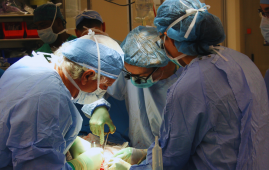

Obstetrician-gynecologists, or OB/GYNs, diagnose, treat, and provide care for a wide range of conditions and milestones. While paired together, the two specialties have distinct differences; obstetrics is the specialization of pregnancy, childbirth, and postpartum, whereas gynecology is the specialization of the female reproductive system, breast disease, family planning, and contraceptive options, infertility, and more. Together, the two fields create a cohesive plan of care for women of all ages and backgrounds.
OB/GYNs receive special training in both obstetrics and gynecology to provide the best possible care to patients. After completing medical school, they must then complete a minimum of four years of resident education in obstetrics and gynecology focused on reproductive and primary health care for women.
To become board certified in obstetrics and gynecology, these medical doctors must complete extensive exams from the American Board of Obstetrics/Gynecology (ABOG). To further their specialization and education, OB/GYNs are able to complete additional training and become a fellow of the American College of Obstetricians and Gynecologists (ACOG).
Most OB/GYNs are generalists. They treat a variety of medical conditions in office, provide examinations, discuss birth control and family planning options, perform surgery, and manage labor and delivery. Typical procedures that obstetrician-gynecologists perform include pap smears, hormone replacement therapy, diagnostic and operative hysteroscopy, laparoscopic hysterectomy, colposcopies, Loop Electrosurgical Excision Procedure (LEEP), and surgical treatment of pelvic organ prolapse.
Obstetrical procedures may include cesarean section and circumcision. Other common conditions treated by an OB/GYN are abnormal bleeding, polycystic ovary syndrome (PCOS), endometriosis, hormonal disorders, and infertility.
more recommended stories
 Texas Medical Board Releases Abortion Training for Physicians
Texas Medical Board Releases Abortion Training for PhysiciansKey Takeaways Texas Medical Board has.
 Safer Allogeneic Stem Cell Transplants with Treg Therapy
Safer Allogeneic Stem Cell Transplants with Treg TherapyA new preclinical study from the.
 Autoimmune Disorders: ADA2 as a Therapeutic Target
Autoimmune Disorders: ADA2 as a Therapeutic TargetAdenosine deaminase 2 (ADA2) has emerged.
 Kaempferol: A Breakthrough in Allergy Management
Kaempferol: A Breakthrough in Allergy ManagementKaempferol, a dietary flavonoid found in.
 Early Milk Cereal Drinks May Spur Infant Weight Gain
Early Milk Cereal Drinks May Spur Infant Weight GainNew research published in Acta Paediatrica.
 TaVNS: A Breakthrough for Chronic Insomnia Treatment
TaVNS: A Breakthrough for Chronic Insomnia TreatmentA recent study conducted by the.
 First-of-Its-Kind Gene-Edited Pig Kidney: Towana’s New Life
First-of-Its-Kind Gene-Edited Pig Kidney: Towana’s New LifeSurgeons at NYU Langone Health have.
 Just-in-Time Training Improves Success & Patient Safety
Just-in-Time Training Improves Success & Patient SafetyA study published in The BMJ.
 ChatGPT Excels in Medical Summaries, Lacks Field-Specific Relevance
ChatGPT Excels in Medical Summaries, Lacks Field-Specific RelevanceIn a recent study published in.
 Study finds automated decision minimizes high-risk medicine combinations in ICU patients
Study finds automated decision minimizes high-risk medicine combinations in ICU patientsA multicenter study coordinated by Amsterdam.

Leave a Comment